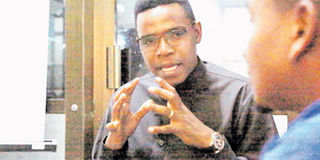Obscure activist in meteoric rise

Chadema member Mr Bob Wangwe speaks to the reporter of this paper at Mwananchi Communication Limited premises on Thursday. PHOTO | SALIM SHAO
What you need to know:
- For Mr Wangwe, rights activists like him in the country are swimming against a deadly current which all energy would be needed to tame
Dar es Salaam. At 28, Bob Wangwe has perhaps built a profile of a household name often craved by many politicians, but which he says is the least of his intention.
Having graduated from university two years ago, Mr Wangwe has barely settled in any particular job, yet he has recently dominated public debate after winning a landmark ruling in court.
A man who refers to himself as a rights activist, Mr Wangwe went to the High Court to challenge the use of district executive directors as returning officers during elections. The court sitting in Dar es Salaam agreed, and handed him and his team a win, for which he has quickly transformed into a public figure of interest.
“Being famous is not important and was the least of my bother when I and other colleagues decided to open a court case to challenge this status quo,” he told The Citizen in an interview.
For Mr Wangwe, rights activists like him in the country are swimming against a deadly current which all energy would be needed to tame. He says he understands the danger that this could pose to different interest groupings but remains unperturbed. “My approach to life is simple and I am not easily intimidated,” says the young man who has had a brush with the law enforcement agencies in the past.
He says he hates rhetoric and does not think one must be in political leadership so as to effect change in one’s community. “I don’t see what I cannot do now that needs a position to be done,” he told The Citizen.
He is a vocal and loud critic of acts of the government that he feels infringes on the fundamental enjoyment of the freedoms of Tanzanians. And he is no stranger to controversy, escaping a one year jail term in November 2017 by paying an alternative fine of Sh5 million for “publication of false information” under the controversial 2015 Cybercrimes Act. As a law student at the University of Dar es Salaam, in March 2016, Wangwe took to Facebook to criticise the annulment of the October 2015 Zanzibar elections. He wrote then that the decision would fill people with hatred. “It is not possible for Zanzibar to remain the colony of Tanzania Mainland under foolish reasons,” he said in the post that earned him the sentence at Kisutu court in Dar es Salaam.
Retrogressing democracy
Wangwe says the decision to challenge the constitutionality of council executives manning elections came after realizing it was a big impediment to democracy and the free will of the public to elect the leaders of their choice.
“We noticed that as a country we were retrogressing in terms of democratic development and thus something needed to be done.”
“We have had numerous contested elections and the DEDs – who are typical functionaries of the ruling Chama cha Mapinduzi are at the centre of all the complaints.”
In a landmark ruling, the High Court ruled on May 10, 2019 that sections 7 (1) and 7 (3) of the National Elections Act, which empower DEDs to supervise and coordinate the registration of voters for presidential, parliamentary and council elections were contrary to the Constitution.
Lady Justice Atuganile Ngala said that sections 7 (1) and 7 (3) of the National Elections Act contradict Section 74 (14) of the Constitution for not setting limitations to ensure independence and accountability of DEDs who double as returning officers during polls. Wangwe was there in the courtroom when the ruling was announced. “I was pleased though I was confident from the beginning that we were going to win the case,” he said. He praised his lawyer Ms Fatuma Karume for putting up a tight argument in the case. “The defendants were presenting very weak arguments and I knew they were losing it.”
Tall and dandy, Wangwe refuses to take any personal credit over the victory, saying that it is not a personal triumph. “It happened that I was the one who filed the case but there was a whole team behind my back which took a lot of trouble.”
Family background
Mr Wangwe was born in 1991 in a small village called Kemakorere, almost 21 kilometres from Tarime town, Mara region.
He went to Sabasaba Primary School in Tarime where he graduated in 2006 to join secondary education at Msangani Secondary School in Kibaha, Coastal region and graduated in 2010. In 2011, he joined St. Mathew High School in the same district for higher secondary education before he joined the National Service. He completed in 2013 and went straight to UDSM for higher education.
He is the son of Chacha Wangwe, a member of parliament for Tarime constituency (Chadema) from 2005 to 2008, when he died in a car accident. The senior Wangwe also served as deputy national chairman (Mainland) of Chadema, the party that he also belongs.
His family boasts of other leaders, a trait he says runs within the family’s three generations. His elder brother Zakayo Chacha Wangwe, is a councillor for Turwa Ward in Tarime district. His paternal uncles Prof Samuel Wangwe, Peter Wangwe, and Daudi Wangwe have served in various public leadership posts.
He has himself been a head prefect in high school and a member of parliament at university. Wangwe describes himself as an entrepreneur who makes use of his profession – law – to make ends meet. He also does activism works under the umbrella of the Tanzania Constitution Forum.
Turbulent period
Wangwe’s take on the country political situation is a mixture of worries and hope. He says that the country is going through a turbulent period of political pluralism that could endanger harmony the country has always enjoyed.
“I think what is required at the moment is political will in the part of those in power in upholding democratic principles as defined in the constitution. Without this, no amendment of laws or change of constitution can make things better,” he reasoned.
His view is that the torment that they were facing as opposition parties’ members was “a blessing in disguise.”
“This is the right time to distinguish an opportunist and a principled politician committed to serving the people,” he says. “I think we have not done enough as the opposition to capitalize in the current situation. I think it is important that we support our rhetoric in demanding freedom with concrete actions. Either through the use of the court system or resorting to people’s power.”
Appeal
Amidst optimism that opposition parties are going to see transformative development within the electoral laws following Wangwe’s victory, the Attorney General, Prof Adelardus Kilangi, has hinted that the State will appeal the High Court ruling.
“We expected it. But we are undaunted and on standby to face the government once again in the courtroom.”




